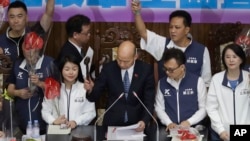Taiwan’s opposition-controlled parliament has passed a set of legal amendments granting lawmakers greater investigative power to scrutinize the government under President Lai Ching-te, who took office on May 20.
Despite days of protests that have attracted hundreds of thousands of people since May 17, the two opposition parties, the China-friendly Kuomintang, or KMT, and the smaller Taiwan People’s Party, or TPP, used their combined majority to push through the deal on Tuesday. The bills still require the president’s signature to become law.
While the KMT and TPP have repeatedly argued that the bills would ensure checks and balances and give the legislature more power to target corruption, their attempt to pass the bills has triggered widespread concerns in civil society and the academic community.
“Now that Taiwan’s legislature has passed the bills, lawmakers will uncover all corrupt officials and all kinds of malpractices in the future,” Fu Kun-chi, the KMT legislative caucus convenor, told journalists on Tuesday. Fu said the opposition parties will form a “special investigation team” to start looking into corruption cases.
As lawmakers were voting on the legislative amendments, thousands of protesters chanted slogans and passed around a giant white ball bearing the phrase “rejecting Chinese political interference.”
Some protesters criticized the opposition parties for undermining Taiwan’s democratic system by fast-tracking the legislative amendments through parliament without thorough negotiations among all political parties.
“There is a democratic negotiation mechanism in Taiwan’s parliament but the opposition parties’ insistence on pushing the bills through the legislature without proper deliberation has violated the regular democratic practices,” Liao Yan-cheng, a 78-year-old retiree, told VOA at the mass demonstration outside the legislature.
Other young protesters said they are worried that the opposition parties will turn Taiwan’s parliament into a tool to undermine the Lai administration’s governance in the next four years.
“Since the opposition parties will maintain control over the legislature for the next four years, they can ramp through this controversial bill without following the proper legislative process,” Max Wang, an 18-year-old student, told VOA at the protest.
The reforms passed on Tuesday grant lawmakers the power to require the president to deliver annual reports and answer questions from lawmakers. Government officials could also be fined or jailed for behaviors deemed “contempt of parliament” by lawmakers.
Additionally, the legislature now has more power to control government budgets and investigate government projects, including the power to ask the military, private companies, or individuals to disclose information deemed relevant to parliamentary investigations.
The ruling Democratic Progressive Party, or DPP, which advocates for Taiwanese sovereignty, said the reforms would undermine Taiwan’s democracy because the laws may constitute an overreach of power.
However, the KMT argues that the amendments could help the legislature rein in the president’s power, which they said has been too extensive. Dozens of legal scholars and two major bar associations in Taiwan have expressed concerns about potential violations of the constitution of the Republic of China — Taiwan’s official name. They argued that the reforms could create many disputes about its applicability in the future.
Huang Cheng-Yi, a legal expert at Academia Sinica in Taiwan, told VOA that since the Republic of China’s constitution doesn’t require the president to be questioned by lawmakers, part of the reform may eventually be viewed unconstitutional by justices when the DPP brings the case to the constitutional court, as the party is expected to do.
In the meantime, some analysts worry that the opposition parties will use the amendments to target the Lai administration.
“The legislators’ enhanced power to investigate government officials could make it easier for the opposition parties to explore possible scandals in the previous government under former Taiwan President Tsai Ing-wen or the current government under Lai Ching-te,” said Austin Wang, an expert on Taiwan politics at the University of Nevada, Las Vegas.
He told VOA that these investigations could slow down the Lai administration’s policy implementation and “harm” his government’s legitimacy as well as Taiwan’s national security.
“Some KMT legislators have been accused of leaking sensitive defense information to China, and this investigation power will be a loophole to help the legislators access more sensitive information,” Wang added.
Wang predicts that Lai, who is facing both domestic division and growing pressure from China, would choose to exercise his constitutional power to ask legislators to reconsider the reforms. “I don’t think Lai will easily back down,” he told VOA.
And since no political party enjoys a majority in parliament, Wang said Taiwan will likely experience political gridlock over the next few months.
“The gridlock may influence defense spending in Taiwan and it will stay there until all three parties agree on some social welfare policies,” he added.
Huang at Academia Sinica worries that if political gridlock becomes the defining feature of Taiwan’s politics over the next four years, it may eventually paralyze the island’s democratic system.
“If all three political parties repeatedly resort to mobilizing supporters to clash with each other, it may ultimately cause Taiwan’s democratic system to cease functioning properly,” he told VOA.



